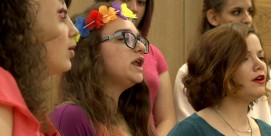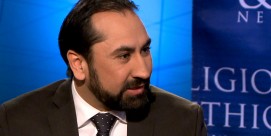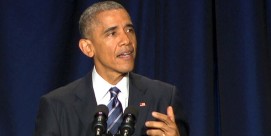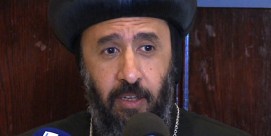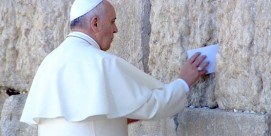In This Episode << SLIDE LEFT TO SEE ADDITIONAL SEGMENTS
Canon Andrew White Extended Interview
Read more of Kim Lawton’s February 1, 2006 interview with Canon Andrew White, president and CEO of the Foundation for Relief and Reconciliation in the Middle East:
The foundation works predominantly in Israel, Palestine, and Iraq, and it’s involved in a wide variety of political and religious encounters, particularly between political leaders and religious leaders. But I also run things like the Iraqi Institute of Peace, and I’m the priest of the Anglican Church in Baghdad. I also look after the chaplaincy in the International Zone. Our organization is based in London, but I probably only spend two or three days of the month there. I spend most of my time between Baghdad and Jerusalem and Gaza, and a little time in America as well, seeing as they run the world.
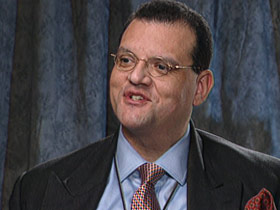
The fact that Hamas has been elected did not surprise us. The reality was that in the West Bank and Gaza, we were seeing an increasing influence from Hamas, so we weren’t surprised at all. What it does say to us, though, is that our understanding of democracy really does not work in the Middle East. The whole peace process is now in jeopardy, and the whole methodology of our work. We can understand why Hamas [was] elected, not least because of the corruption within the Palestinian Authority and Fatah. But the results are really quite worrying.
Let’s look at the last three recent elections. We’ve had an election in Iran, and I haven’t heard anybody say that that was good thing. We’ve had an election in Iraq whereby they still have not chosen the leader of the nation. And we’ve had the election in Palestine whereby terrorists were elected. So we’ve got to face the reality that so often in these parts of the world there is a desire to have a strong leader. And one of the other things we have to take seriously is the role of religion in the Middle East. We see that religion has power, and that power can be abused as well as being creative.
The sad fact is that as we look at the countries which really work in the Middle East, countries like Jordan and Morocco, we see that they’re actually benevolent dictatorships. How do you guarantee that somebody is going to be a benevolent dictator? It’s not an easy thing to do. The other reality is that democracy took a very long time to develop in America and certainly in Britain as well, and we shouldn’t imagine that Middle Eastern democracy will be exactly as we would like it in the West immediately. It may take many years indeed.
The fact is that benevolent rulers seem to be the most successful way of running Middle Eastern countries. In Iraq, one of the sad problems was that no one took seriously the reinstatement of a king in Iraq. If we had a king in Iraq and a constitutional monarchy and system of democracy, I think that may have worked. And the rightful heir to the Iraqi throne was just up the road in Jordan all the time.
I think the West has to take seriously the religious dimensions [of international politics and life in the Middle East]. We can’t continue to pretend that they don’t exist because we don’t know how to deal with them. We have to take very seriously the religious motivations of the people. The fact is that in difficult times, people tend to become more and more religious. It’s only when we take seriously the engagement between the religious and the political that we can actually move forward.
At the Clinton Global Initiative this year, I was talking to Madeleine Albright at one point, and she said one major mistake that she made in her years as secretary of state was that she didn’t actually take seriously the religious contribution to peacemaking. Now she’s writing a book called THE MIGHTY AND THE ALMIGHTY, which deals with this very subject. I think to start with we have to take seriously the religious leadership and realize that religious leadership often is behind our attempt for a democratic process. Even in Iraq, we saw Ali al-Sistani, the Grand Ayatollah, saying he wasn’t going to support a particular Shiite list this time as he did last time [in the election]. But at the same time he said quite categorically that the people were to vote for religious Shia, and they did in masses.
If the issue of religion is a problem, and it certainly is, we’ve got to also realize that it’s part of the cure, and so much of our work [is] to engage with the religious leadership and get them to engage with the political leaders as well.
Certainly looking at the coalition in Iraq and the quartet in Israel and Palestine, at every level we see a real fear amongst Western politicians and diplomats to really engage with the religious issues.
The majority of the funding of the Palestinian Authority comes from Western governments, in particular from the European Union and the United States of America, and they can’t be seen to be supporting [a] Palestinian terrorist organization. At the same time there’s a very real concern and fear about the effect that this withdrawal of funding will have on some of the welfare institutions, such as the clinics and the hospitals and even the schools — how will these be run without funding? We’ve got to find new ways to fund individual institutions without giving the money to the Palestinian Authority.
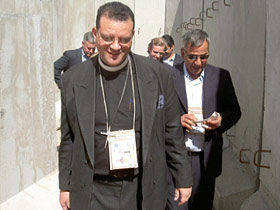
All of the religious leaders of Israel and Palestine have been involved in the religious track of the peace process, which I coordinate, including the Christian leaders. We’ve got to understand that the election of the Hamas does actually make things rather difficult for many of the Christians as well, though it’s interesting that in the last election, more Christians were elected than any time before. Ten Christians were elected to the Palestinian Authority, and they’re all Fatah members, so a quarter of the Fatah’s elected members are, indeed, Christians. But the key thing is, how can we move forward in a peaceful way, at the same time acknowledging that a democratic process has taken place?
The Christians are saying, some of them are saying that they have been under constant Islamic pressure and attack for considerable time, certainly before the Bethlehem siege [in 2002], which I was very involved in. And they have seen that the Christians have really been the people caught in between. On the one hand, they have been used as channels for violence from some of the Islamic militants. On the other hand, they have been attacked by Israel as well. And then there are a group of Christians who would like to be under Israeli sovereignty rather than the Palestinian Authority.
There were churches [in Iraq] bombed this last weekend [January 28-29, 2006], including my church as well. And I have had four of my lay leaders probably killed in the past few months. They disappeared on the 12th of September, and I haven’t seen them since. But the real issue is that all religious communities are under pressure and have to deal with increased violence. The greatest number of attacks have actually been on Shia mosques, and the only reason there has not been a war between Shia and Sunni is that Ayatollah Ali Sistani has really tried very hard to prevent the Shia from reacting. But all of the religious communities are under increased pressures — Sunni, Christian, Shia, and Kurdish.
Our church [St. George’s Memorial Church in Baghdad] was reopened after the war, and we thought initially predominantly it would be a church for the expatriate congregations. But the congregation has grown very rapidly. It’s now over 800 in number and there are no Anglicans there, apart from a little baby I baptized the other day, named after me and the bishop. So there are two Anglicans in Iraq, both of them named Andrew. But the sad fact is that the church and most of its members that are not Anglican are coming because they are too afraid to travel to their own churches, which may be over a mile away. That distance to travel has become increasingly dangerous. The bishop of Cyprus and the Gulf who covers Iraq has said very clearly that he hopes that eventually people will go back to their own churches. But we don’t have that happening yet or any chance of that happening. The congregations are all Iraqi, apart from the congregation in the International Zone, which is almost exclusively American, with just a few English.
Our lay leaders [from St. George’s] went to a church meeting in Jordan on September 3. They were due back on the 12th of September, and we have accounts of them being attacked, but we have never seen them since that day, and included in that number were a husband and wife. It’s not straightforward having what is in essence the most dangerous parish in the world. We have to just keep hoping and moving forward with our simple trust in God. My recent talk on Iraq was called “Iraq: Searching for Hope.” I think that title describes what we often have to do. We’re looking for hope a lot of the time, and trying to find ways of maintaining our hope. It’s very difficult to maintain hope in such difficult circumstances, but we do. And we do because of our faith; our hope is often more theological than political.
We work very closely with the American government, and I think the American government is doing a good job. But the American government is no longer in control of Iraq. It’s actually the Iraqi government that’s in control of Iraq. I think that the evil regime of Saddam Hussein certainly needed removing, and there was no way that that could be done by the Iraqi people and fortunately, I would say, even in the difficulties we’re now facing, the Americans came to the rescue of the Iraqi people. I must say, seeing the news in the U.S.A., it’s very difficult to get a real assessment of what is actually going on, while at the same time we’ve got to realize that covering news in Iraq has become increasingly difficult. We’ve got a journalist at the moment who has been kidnapped, and this is the very real risk for those who’ve tried to get the real story across. I think we need to tell the story about how the restoration of Iraq is taking place despite the difficulties, and that it’s not totally all chaos. Chaos and bloodshed are a very big part of what’s going on, but it’s not the total story.
We are very involved in the hostage negotiation. I can’t go into individual cases that I may be involved in, but the sad reality is that we can only make progress if we deal with the hostage takers themselves.
I’ve worked very closely with [Iraq’s religious leaders] for many years, [since] well before the war. I’ve been backwards and forwards to Iraq since 1998. So I do know most of the religious leaders there, and we have a very good relationship with all of them. In 2004, in February, we actually signed the Baghdad Religious Accord, which brought together all of the religious leaders. But we’ve got to understand the difficulty of it. It’s not easy for so many of these religious leaders even to meet with us now, because it would be hard for them to get access to the International Zone, where we’re based. We continue to communicate with them, but it’s not straightforward. Certainly Iraqi religious leaders have been both here to America and to the UK with me.
All around us we see this increasing tension between Islam and Christianity. The Huntington theory, the clash of civilizations, certainly needs to be taken seriously. We have seen in the world today an increasing tension between the Western world and the Islamic world. Often that is perceived as being a clash between Christianity and Islam, and Islam certainly sees that much of the Western world is Christian, even though it may not be. So we have to deal very seriously with this issue and take it seriously and try to find a way through.
It’s quite strange for me, coming from a country where there is a link between church and state to a country where there isn’t, in theory, a link between church and state, but the link is far stronger than in our own country. I think it can be a positive thing, but only if the leaders of your nation take seriously the need for religious engagement with the political leadership [in the Middle East].
My prayer for the Middle East is really that we’ll have stability. We look at Israel, Palestine — even 10 years ago it was so much better than today. And we really long for a kind of stability whereby it’s safe to walk on the streets again, whereby people are not kidnapped, whereby there is not increasing violence between Jews and Muslims or Israelis and Palestinians. That’s what I’m praying for.

